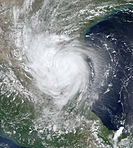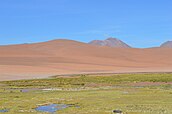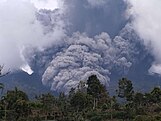From today's featured article
Hurricane Erika was a weak hurricane that struck northeastern Mexico in August of the 2003 Atlantic hurricane season. Erika was the eighth tropical cyclone, fifth tropical storm, and third hurricane of the season. At first, the National Hurricane Center did not designate it as a hurricane because initial data suggested winds of only 70 mph (110 km/h) at Erika's peak intensity, but it was retroactively deemed a hurricane based on further data. Developing in the eastern Gulf of Mexico on August 14, Erika moved quickly westward and strengthened under favorable conditions. It made landfall as a hurricane on northeastern Mexico on August 16. The storm's low-level circulation center dissipated by the next day. However, the storm's mid-level circulation persisted for another three days, emerging into the Pacific and moving northwestward over Baja California, before dissipating on August 20. Two people were killed in northeastern Mexico when their vehicle was swept away by floodwaters. (Full article...)
Did you know ...
- ... that the green colour of bofedales (examples pictured) stands out in the yellow surrounding landscape?
- ... that Anthony Bennett is part of a football family, with his father, uncle, cousin, and older brother all playing professionally?
- ... that Che Guevara was almost killed in the Democratic Republic of the Congo during Operation South?
- ... that Lore Maria Peschel-Gutzeit once advocated for a "right to vote from birth"?
- ... that a train runs along the roof at Miami International Airport?
- ... that Ding Xuesong was the first female ambassador of the People's Republic of China?
- ... that actress Louise Franklin replaced the main dancing role in 1945's Pillow to Post after Dorothy Dandridge was injured in a car accident?
- ... that history sniffing has been used to track Papa John's customers?
In the news
- Mount Marapi erupts (pictured) on the island of Sumatra in Indonesia, killing 22 hikers.
- Former U.S. secretary of state Henry Kissinger dies at the age of 100.
- All 41 workers trapped in a road tunnel collapse in Uttarakhand, India, are rescued after 17 days underground.
- In motorcycle racing, Francesco Bagnaia wins the MotoGP World Championship.
- The novel Prophet Song by Paul Lynch wins the Booker Prize.
On this day
December 5: Krampusnacht in parts of Central Europe
- 1757 – Seven Years' War: Prussian troops under Frederick the Great defeated Austrian forces at the Battle of Leuthen (pictured).
- 1807 – Napoleonic Wars: British ships began a raid on Griessie after the Dutch captain refused a British demand for surrender.
- 1918 – National Guards and Sokol volunteers protested in Zagreb, leading to an armed clash with regiments of the Home Guard and former Common Army.
- 1933 – The prohibition of alcoholic beverages in the United States officially ended when the Twenty-first Amendment to the U.S. Constitution was ratified, repealing the Eighteenth Amendment.
- 1958 – Britain's first motorway, the Preston By-pass, opened to the public.
- Sigismund Rákóczi (d. 1608)
- Yūjirō Motora (b. 1858)
- Priscilla Jana (b. 1943)
- Neil Druckmann (b. 1978)
Today's featured picture

|
Columbidae is a bird family consisting of doves and pigeons. In English, the smaller species tend to be called doves and the larger ones pigeons, but this distinction is not always consistent and scientifically there is no separation between them. Pigeons and doves are distributed everywhere on Earth, except for the driest areas of the Sahara, Antarctica and its surrounding islands, and the high Arctic. The family has adapted to most of the habitats available on the planet. There is a considerable variation in size between species, ranging in length from 15 to 75 cm (6 to 30 in), and in weight from 30 g (1 oz) to above 2 kg (4 lb). Overall, the anatomy of Columbidae is characterized by short legs, short bills with a fleshy beak, and small heads on large, compact bodies. The wings are large, and have eleven primary feathers; they have strong wing muscles and are among the strongest fliers of all birds. They primarily feed on seeds, fruits, and plants. This red-eyed dove (Streptopelia semitorquata) was photographed on the Zambezi in Zimbabwe, near Kazungula Bridge. Photograph credit: Charles J. Sharp
Recently featured:
|
Other areas of Wikipedia
- Community portal – The central hub for editors, with resources, links, tasks, and announcements.
- Village pump – Forum for discussions about Wikipedia itself, including policies and technical issues.
- Site news – Sources of news about Wikipedia and the broader Wikimedia movement.
- Teahouse – Ask basic questions about using or editing Wikipedia.
- Help desk – Ask questions about using or editing Wikipedia.
- Reference desk – Ask research questions about encyclopedic topics.
- Content portals – A unique way to navigate the encyclopedia.
Wikipedia's sister projects
Wikipedia is written by volunteer editors and hosted by the Wikimedia Foundation, a non-profit organization that also hosts a range of other volunteer projects:
-
Commons
Free media repository -
MediaWiki
Wiki software development -
Meta-Wiki
Wikimedia project coordination -
Wikibooks
Free textbooks and manuals -
Wikidata
Free knowledge base -
Wikinews
Free-content news -
Wikiquote
Collection of quotations -
Wikisource
Free-content library -
Wikispecies
Directory of species -
Wikiversity
Free learning tools -
Wikivoyage
Free travel guide -
Wiktionary
Dictionary and thesaurus
Wikipedia languages
This Wikipedia is written in English. Many other Wikipedias are available; some of the largest are listed below.
-
1,000,000+ articles
-
250,000+ articles
-
50,000+ articles



